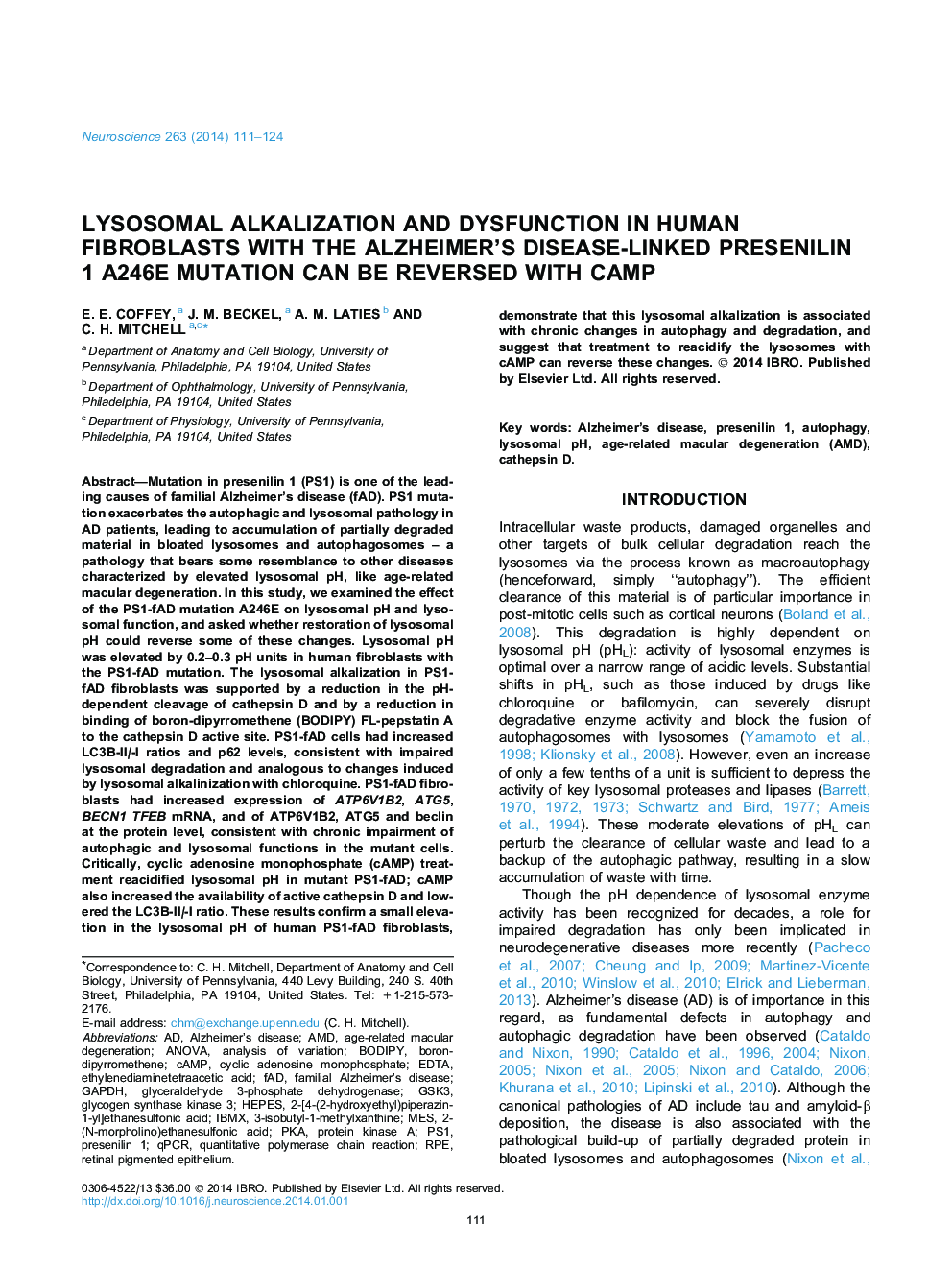| کد مقاله | کد نشریه | سال انتشار | مقاله انگلیسی | نسخه تمام متن |
|---|---|---|---|---|
| 4337734 | 1614813 | 2014 | 14 صفحه PDF | دانلود رایگان |

• Fibroblasts with the Alzheimer’s-associated PS1 mutation A246E have elevated lysosomal pH.
• PS1-fAD fibroblasts with reduction in pH-dependent cathepsin D maturation and active site access.
• Increased lysosomal pH correlates with accumulation of proteins normally degraded by autophagy.
• PS1-fAD fibroblasts up-regulate the expression of genes and proteins linked to lysosomal pH.
• Raising intracellular cAMP lowers lysosomal pH, reduces protein buildup in PS1-fAD fibroblasts.
Mutation in presenilin 1 (PS1) is one of the leading causes of familial Alzheimer’s disease (fAD). PS1 mutation exacerbates the autophagic and lysosomal pathology in AD patients, leading to accumulation of partially degraded material in bloated lysosomes and autophagosomes – a pathology that bears some resemblance to other diseases characterized by elevated lysosomal pH, like age-related macular degeneration. In this study, we examined the effect of the PS1-fAD mutation A246E on lysosomal pH and lysosomal function, and asked whether restoration of lysosomal pH could reverse some of these changes. Lysosomal pH was elevated by 0.2–0.3 pH units in human fibroblasts with the PS1-fAD mutation. The lysosomal alkalization in PS1-fAD fibroblasts was supported by a reduction in the pH-dependent cleavage of cathepsin D and by a reduction in binding of boron-dipyrromethene (BODIPY) FL-pepstatin A to the cathepsin D active site. PS1-fAD cells had increased LC3B-II/-I ratios and p62 levels, consistent with impaired lysosomal degradation and analogous to changes induced by lysosomal alkalinization with chloroquine. PS1-fAD fibroblasts had increased expression of ATP6V1B2, ATG5, BECN1 TFEB mRNA, and of ATP6V1B2, ATG5 and beclin at the protein level, consistent with chronic impairment of autophagic and lysosomal functions in the mutant cells. Critically, cyclic adenosine monophosphate (cAMP) treatment reacidified lysosomal pH in mutant PS1-fAD; cAMP also increased the availability of active cathepsin D and lowered the LC3B-II/-I ratio. These results confirm a small elevation in the lysosomal pH of human PS1-fAD fibroblasts, demonstrate that this lysosomal alkalization is associated with chronic changes in autophagy and degradation, and suggest that treatment to reacidify the lysosomes with cAMP can reverse these changes.
The elevation of lysosomal pH associated with mutations in PS1-fAD prevents degradative enzymes from properly processing cellular waste material, leading to a backlog of autophagic makers LC3Bll/l and p62, and a compensatory up-regulation of the genes ATP6V1B2, ATG5, BECN1, and TFEB. Treatment re-acidifies lysosomes and enhances autophagic throughput. Yellow dots indicate incompletely degraded and aggregate material.Figure optionsDownload high-quality image (62 K)Download as PowerPoint slide
Journal: Neuroscience - Volume 263, 28 March 2014, Pages 111–124